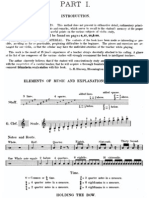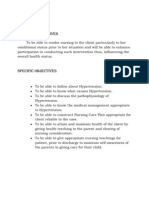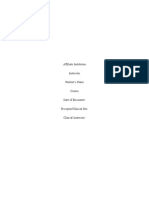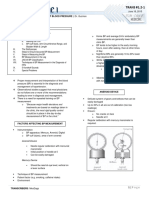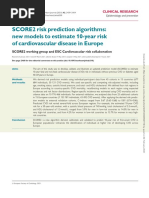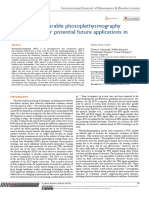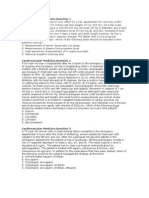Primary (Essential) Hypertension
Primary (Essential) Hypertension
Uploaded by
Norjetalexis CabreraCopyright:
Available Formats
Primary (Essential) Hypertension
Primary (Essential) Hypertension
Uploaded by
Norjetalexis CabreraOriginal Description:
Original Title
Copyright
Available Formats
Share this document
Did you find this document useful?
Is this content inappropriate?
Copyright:
Available Formats
Primary (Essential) Hypertension
Primary (Essential) Hypertension
Uploaded by
Norjetalexis CabreraCopyright:
Available Formats
High blood pressure is a common condition in which the force of the blood against your artery walls is high
enough that it may eventually cause health problems, such as heart disease. Blood pressure is determined by the amount of blood your heart pumps and the amount of resistance to blood flow in your arteries. The more blood your heart pumps and the narrower your arteries, the higher your blood pressure. You can have high blood pressure (hypertension) for years without any symptoms. Uncontrolled high blood pressure increases your risk of serious health problems, including heart attack and stroke. High blood pressure typically develops over many years, and it affects nearly everyone eventually. Fortunately, high blood pressure can be easily detected. And once you know you have high blood pressure, you can work with your doctor to control it. Most people with high blood pressure have no signs or symptoms, even if blood pressure readings reach dangerously high levels. Although a few people with early-stage high blood pressure may have dull headaches, dizzy spells or a few more nosebleeds than normal, these signs and symptoms typically don't occur until high blood pressure has reached a severe even life-threatening stage. When to see a doctor You'll likely have your blood pressure taken as part of a routine doctor's appointment. Ask your doctor for a blood pressure reading at least every two years starting at age 18. He or she will likely recommend more frequent readings if you've already been diagnosed with high blood pressure or other risk factors for cardiovascular disease. Children age 3 and older will usually have their blood pressure measured as a part of their yearly checkups. If you don't regularly see your doctor, you may be able to get a free blood pressure screening at a health resource fair or other locations in your community. You can also find machines in some stores that will measure your
blood pressure for free, but these machines can give you inaccurate results. There are two types of high blood pressure. Primary (essential) hypertension For most adults, there's no identifiable cause of high blood pressure. This type of high blood pressure, called essential hypertension or primary hypertension, tends to develop gradually over many years. Secondary hypertension Some people have high blood pressure caused by an underlying condition. This type of high blood pressure, called secondary hypertension, tends to appear suddenly and cause higher blood pressure than does primary hypertension. Various conditions and medications can lead to secondary hypertension, including: Kidney problems Adrenal gland tumors Certain defects in blood vessels you're born with (congenital) Certain medications, such as birth control pills, cold remedies, decongestants, over-the-counter pain relievers and some prescription drugs Illegal drugs, such as cocaine and amphetamines Age. The risk of high blood pressure increases as you age. Through early middle age, high blood pressure is more common in men. Women are more likely to develop high blood pressure after menopause. Race. High blood pressure is particularly common among blacks, often developing at an earlier age than it does in whites. Serious complications, such as stroke and heart attack, also are more common in blacks. Family history. High blood pressure tends to run in families. Being overweight or obese. The more you weigh, the more blood you need to supply oxygen and nutrients to your tissues. As the volume of blood circulated through your blood
vessels increases, so does the pressure on your artery walls. Not being physically active. People who are inactive tend to have higher heart rates. The higher your heart rate, the harder your heart must work with each contraction and the stronger the force on your arteries. Lack of physical activity also increases the risk of being overweight. Using tobacco. Not only does smoking or chewing tobacco immediately raise your blood pressure temporarily, but the chemicals in tobacco can damage the lining of your artery walls. This can cause your arteries to narrow, increasing your blood pressure. Secondhand smoke also can increase your blood pressure. Too much salt (sodium) in your diet. Too much sodium in your diet can cause your body to retain fluid, which increases blood pressure. Too little potassium in your diet. Potassium helps balance the amount of sodium in your cells. If you don't get enough potassium in your diet or retain enough potassium, you may accumulate too much sodium in your blood. Too little vitamin D in your diet. It's uncertain if having too little vitamin D in your diet can lead to high blood pressure. Vitamin D may affect an enzyme produced by your kidneys that affects your blood pressure. Drinking too much alcohol. Over time, heavy drinking can damage your heart. Having more than two drinks a day can raise your blood pressure. Stress. High levels of stress can lead to a temporary, but dramatic, increase in blood pressure. If you try to relax by eating more, using tobacco or drinking alcohol, you may only increase problems with high blood pressure. Certain chronic conditions. Certain chronic conditions also may increase your risk of high blood pressure, including high cholesterol, diabetes, kidney disease and sleep apnea. Sometimes pregnancy contributes to high blood pressure, as well.
Although high blood pressure is most common in adults, children may be at risk, too. For some children, high blood pressure is caused by problems with the kidneys or heart. But for a growing number of kids, poor lifestyle habits such as an unhealthy diet and lack of exercise contribute to high blood pressure. Blood pressure is measured with an inflatable arm cuff and a pressure-measuring gauge. A blood pressure reading, given in millimeters of mercury (mm Hg), has two numbers. The first, or upper, number measures the pressure in your arteries when your heart beats (systolic pressure). The second, or lower, number measures the pressure in your arteries between beats (diastolic pressure). Blood pressure measurements fall into four general categories: Normal blood pressure. Your blood pressure is normal if it's below 120/80 mm Hg. However, some doctors recommend 115/75 mm Hg as a better goal. Once blood pressure rises above 115/75 mm Hg, the risk of cardiovascular disease begins to increase. Prehypertension. Prehypertension is a systolic pressure ranging from 120 to 139 mm Hg or a diastolic pressure ranging from 80 to 89 mm Hg. Prehypertension tends to get worse over time. Stage 1 hypertension. Stage 1 hypertension is a systolic pressure ranging from 140 to 159 mm Hg or a diastolic pressure ranging from 90 to 99 mm Hg. Stage 2 hypertension. More severe hypertension, stage 2 hypertension is a systolic pressure of 160 mm Hg or higher or a diastolic pressure of 100 mm Hg or higher. Both numbers in a blood pressure reading are important. But after age 50, the systolic reading is even more significant. Isolated systolic hypertension when diastolic pressure is normal but systolic pressure is high is the most common type of high blood pressure among people older than 50. Your doctor will likely take two to three blood pressure readings each at two or more separate appointments before diagnosing you with high blood pressure. This is because blood pressure normally varies throughout the day and sometimes specifically during visits to the
doctor, a condition called white-coat hypertension. Your doctor may ask you to record your blood pressure at home and at work to provide additional information.
pressure and whether you also have other medical problems. Medications to treat high blood pressure
If you have any type of high blood pressure, your doctor may recommend routine tests, such as a urine test (urinalysis), blood tests and an electrocardiogram (ECG) a test that measures your heart's electrical activity. Your doctor may also recommend additional tests, such as a cholesterol test, to check for more signs of heart disease. Taking your blood pressure at home An important way to check if your blood pressure treatment is working, or to diagnose worsening high blood pressure, is to monitor your blood pressure at home. Home blood pressure monitors are widely available, and you don't need a prescription to buy one. Talk to your doctor about how to get started. Your blood pressure treatment goal depends on how healthy you are. Thiazide diuretics. Diuretics, sometimes called water pills, are medications that act on your kidneys to help your body eliminate sodium and water, reducing blood volume. Thiazide diuretics are often the first but not the only choice in high blood pressure medications. If you're not taking a diuretic and your blood pressure remains high, talk to your doctor about adding one or replacing a drug you currently take with a diuretic. Beta blockers. These medications reduce the workload on your heart and open your blood vessels, causing your heart to beat slower and with less force. When prescribed alone, beta blockers don't work as well in blacks or in older adults but they're effective when combined with a thiazide diuretic. Angiotensin-converting enzyme (ACE) inhibitors. These medications help relax blood vessels by blocking the formation of a natural chemical that
Blood pressure treatment goals*
140/90 mm Hg or lower 130/80 mm Hg or lower If you have chronic kidney disease, diabetes or coronary artery disease or are at high risk of coronary artery disease 120/80 mm Hg or lower If your heart isn't pumping as well as it should (left ventricular dysfunction or heart failure) or you have severe chronic kidney disease If you are a healthy adult
narrows blood vessels. Angiotensin II receptor blockers (ARBs). These medications help relax blood vessels by blocking the action not the formation of a natural chemical that narrows blood vessels. Calcium channel blockers. These medications help relax the muscles of your blood vessels. Some slow your heart rate. Calcium channel blockers may work better for blacks and older adults than do ACE inhibitors or beta blockers alone. A word of caution for grapefruit lovers, though. Grapefruit juice interacts with some calcium channel blockers, increasing blood levels of the medication and putting you at higher risk of side effects. Talk to your doctor or pharmacist if you're concerned
*Although 120/80 mm Hg or lower is the ideal blood pressure goal, doctors are unsure if you need treatment (medications) to reach that level. If you're an adult age 80 or older and your blood pressure is very high, your doctor may set a target blood pressure goal for you that's slightly higher than 140/90 mm Hg. Changing your lifestyle can go a long way toward controlling high blood pressure. But sometimes lifestyle changes aren't enough. In addition to diet and exercise, your doctor may recommend medication to lower your blood pressure. Which category of medication your doctor prescribes depends on your stage of high blood
about interactions. Renin inhibitors. Aliskiren (Tekturna) slows down the production of renin, an enzyme produced by your kidneys that starts a chain of chemical steps that increases blood pressure. Tekturna works by reducing the ability of renin to begin this process. Due to a risk of serious complications, including stroke, you shouldn't take aliskiren with ACE inhibitors or ARBs.
If you're having trouble reaching your blood pressure goal with combinations of the above medications, your doctor may prescribe: Alpha blockers. These medications reduce nerve impulses to blood vessels, reducing the effects of natural chemicals that narrow blood vessels. Alpha-beta blockers. In addition to reducing nerve impulses to blood vessels, alpha-beta blockers slow the heartbeat to reduce the amount of blood that must be pumped through the vessels. Central-acting agents. These medications prevent your brain from signaling your nervous system to increase your heart rate and narrow your blood vessels. Vasodilators. These medications work directly on the muscles in the walls of your arteries, preventing the muscles from tightening and your arteries from narrowing. Once your blood pressure is under control, your doctor may have you take a daily aspirin to reduce your risk of cardiovascular disorders.
four different types of medications at the same time to achieve that control also are considered to have resistant hypertension. Having resistant hypertension doesn't mean your blood pressure will never get lower. In fact, if you and your doctor can identify what's behind your persistently high blood pressure, there's a good chance you can meet your goal with the help of treatment that's more effective. Your doctor or hypertension specialist can evaluate whether the medications and doses you're taking for your high blood pressure are appropriate. You may have to fine-tune your medications to come up with the most effective combination and doses. In addition, you and your doctor can review medications you're taking for other conditions. Some medications, foods or supplements can worsen high blood pressure or prevent your high blood pressure medications from working effectively. Be open and honest with your doctor about all the medications or supplements you take. If you don't take your high blood pressure medications
To reduce the number of daily medication doses you need, your doctor may prescribe a combination of lowdose medications rather than larger doses of one single drug. In fact, two or more blood pressure drugs often work better than one. Sometimes finding the most effective medication or combination of drugs is a matter of trial and error.
exactly as directed, your blood pressure can pay the price. If you skip doses because you can't afford the medication, because you have side effects or because you simply forget to take your medications, talk to your doctor about solutions. Don't change your treatment without your doctor's guidance. Lifestyle changes can help you control and prevent high
Lifestyle changes to treat high blood pressure No matter what medications your doctor prescribes to treat your high blood pressure, you'll need to make lifestyle changes to lower your blood pressure. These changes usually include eating a healthier diet with less salt (the Dietary Approaches to Stop Hypertension, or DASH, diet), exercising more, quitting smoking and losing weight. Resistant hypertension: When your blood pressure is difficult to control If your blood pressure remains stubbornly high despite taking at least three different types of high blood pressure drugs, one of which should be a diuretic, you may have resistant hypertension. Resistant hypertension is blood pressure that's resistant to treatment. People who have controlled high blood pressure but are taking
blood pressure even if you're taking blood pressure medication. Here's what you can do: Eat healthy foods. Try the Dietary Approaches to Stop Hypertension (DASH) diet, which emphasizes fruits, vegetables, whole grains and low-fat dairy foods. Get plenty of potassium, which can help prevent and control high blood pressure. Eat less saturated fat and total fat. Decrease the salt in your diet. A lower sodium level 1,500 milligrams (mg) a day is appropriate for people 51 years of age or older, and individuals of any age who are African-American or who have hypertension, diabetes or chronic kidney disease. Otherwise healthy people can aim for 2,300 mg a day or less. While you can reduce the amount of salt you eat by putting down the saltshaker, you should also pay attention to the
amount of salt that's in the processed foods you eat, such as canned soups or frozen dinners. Maintain a healthy weight. If you're overweight, losing even 5 pounds (2.3 kilograms) can lower your blood pressure. Increase physical activity. Regular physical activity can help lower your blood pressure and keep your weight under control. Strive for at least 30 minutes of physical activity a day. Limit alcohol. Even if you're healthy, alcohol can raise your blood pressure. If you choose to drink alcohol, do so in moderation up to one drink a day for women and everyone older than age 65, and two drinks a day for men. Don't smoke. Tobacco injures blood vessel walls and speeds up the process of hardening of the arteries. If you smoke, ask your doctor to help you quit. Manage stress. Reduce stress as much as possible. Practice healthy coping techniques, such as muscle relaxation and deep breathing. Getting plenty of sleep can help, too. Monitor your blood pressure at home. Home blood pressure monitoring can help you keep closer tabs on your blood pressure, show if medication is working, and even alert you and your doctor to potential complications. If your blood pressure is under control, you may be able to make fewer visits to your doctor if you monitor your blood pressure at home. Practice relaxation or slow, deep breathing. Practice taking deep, slow breaths to help relax. There are some devices available that can help guide your breathing for relaxation; however, it's questionable whether these devices have a significant effect on lowering your blood pressure.
You might also like
- Practice Test Medical Surgical Nursing 150 Items PDFDocument9 pagesPractice Test Medical Surgical Nursing 150 Items PDFPondang Reviewers BulacanNo ratings yet
- Primary Aldosteronism - A Multidimensional SyndromeDocument18 pagesPrimary Aldosteronism - A Multidimensional SyndromeErwin SiahaanNo ratings yet
- Sodium, and 350-500 Meq/L of Chloride. The Combined Effects of Serum Hyperosmolarity, Dehydration, and Acidosis Result in Increased Osmolarity in Brain Cells That ClinicallyDocument5 pagesSodium, and 350-500 Meq/L of Chloride. The Combined Effects of Serum Hyperosmolarity, Dehydration, and Acidosis Result in Increased Osmolarity in Brain Cells That ClinicallyMorgan Mitchell100% (10)
- Heart Disease Knowledge QuestionnaireDocument2 pagesHeart Disease Knowledge QuestionnaireFerdy LainsamputtyNo ratings yet
- 10 Ways To Control High Blood Pressure Without MedicationDocument4 pages10 Ways To Control High Blood Pressure Without Medicationneyemhey2344920No ratings yet
- Anti Diabetic DrugsDocument58 pagesAnti Diabetic DrugsDaniel Wang100% (1)
- Hersey Modern Violin MethodDocument53 pagesHersey Modern Violin Methodovidiu4u2003100% (2)
- Challenging Concepts in Anaesthesia Cases With Expert Commentary 1st Edition, Kindle EditionDocument335 pagesChallenging Concepts in Anaesthesia Cases With Expert Commentary 1st Edition, Kindle EditionHisham Elkilaney100% (1)
- Medical-Surgical Nursing Assessment and Management of Clinical Problems 9e Chapter 67Document11 pagesMedical-Surgical Nursing Assessment and Management of Clinical Problems 9e Chapter 67sarasjunkNo ratings yet
- Pulse Contour Cardiac Output Learning Package PDFDocument17 pagesPulse Contour Cardiac Output Learning Package PDFNurse PractitionerNo ratings yet
- HypertensionDocument4 pagesHypertensionKhaira CharmagneNo ratings yet
- Hyperthyroidism and Thyroid Storm: Tintinalli Chapter 215 12/15/05Document44 pagesHyperthyroidism and Thyroid Storm: Tintinalli Chapter 215 12/15/05Charith KumaraNo ratings yet
- Herbs and Spices-DftaDocument4 pagesHerbs and Spices-Dftaapi-347430373No ratings yet
- Introducing High Blood PressureDocument12 pagesIntroducing High Blood PressurePatel AshokNo ratings yet
- Type I Diabetes, A Simple Guide To The Condition, Diagnosis, Treatment And Related ConditionsFrom EverandType I Diabetes, A Simple Guide To The Condition, Diagnosis, Treatment And Related ConditionsNo ratings yet
- Drug Management of Thyroid DiseaseDocument22 pagesDrug Management of Thyroid DiseaseHassan.shehri100% (6)
- Heart Failure and Ejection FractionDocument1 pageHeart Failure and Ejection FractionCecil-An DalanonNo ratings yet
- Arrhythmia: CausesDocument21 pagesArrhythmia: CausesDagmawit Girma100% (1)
- Hypertensive Heart DiseasesDocument5 pagesHypertensive Heart DiseasesserubimNo ratings yet
- Cam Therapies, Vitamins, Otc StudentDocument30 pagesCam Therapies, Vitamins, Otc StudentLynn EarnestNo ratings yet
- Hypertension Treatment Steps For HypertensionDocument15 pagesHypertension Treatment Steps For Hypertensionfreelancer08100% (1)
- Ayurvedic Intervention For Hepatobiliary Disorders Current Scenario Andfuture Prospect2Document6 pagesAyurvedic Intervention For Hepatobiliary Disorders Current Scenario Andfuture Prospect2Ramachandran RadhakrishnanNo ratings yet
- Acute Renal Failure StudyDocument4 pagesAcute Renal Failure StudyElyne BicaldoNo ratings yet
- HypertensionDocument19 pagesHypertensionmr_coolz282344No ratings yet
- Diabetes - EditedDocument11 pagesDiabetes - EditedIssah Issah100% (1)
- RMUPPC Module 1 Diabetes, Nutrition, Lab ResultsDocument6 pagesRMUPPC Module 1 Diabetes, Nutrition, Lab ResultshevinpatelNo ratings yet
- Mds 3Document3 pagesMds 3api-434982019No ratings yet
- Thyroid Disease: Presentation By: Pimundu Vicent Audo Ritah Tutor: Dr. Fualal JaneDocument41 pagesThyroid Disease: Presentation By: Pimundu Vicent Audo Ritah Tutor: Dr. Fualal JaneEsther AumaNo ratings yet
- Medical Therapy in GoiterDocument43 pagesMedical Therapy in GoiterIka Niswatul ChamidahNo ratings yet
- What Is HyperthyroidismDocument7 pagesWhat Is HyperthyroidismGelo LeañoNo ratings yet
- Hyperthyroidism: Prevalence Women 2% Men 0.2% 15% of Cases Occur in Patients Older Than 60 Years of AgeDocument54 pagesHyperthyroidism: Prevalence Women 2% Men 0.2% 15% of Cases Occur in Patients Older Than 60 Years of AgeMegan MendozaNo ratings yet
- JNC 8Document40 pagesJNC 8Nadira Wulandari100% (1)
- Lab Normal Value Comments: AlbuminDocument4 pagesLab Normal Value Comments: AlbumindelantarzNo ratings yet
- Administration of Intramuscular and Sub Cutaneous InjectionsDocument13 pagesAdministration of Intramuscular and Sub Cutaneous InjectionsSundeep SharmaNo ratings yet
- History and Physical Examination TemplateDocument3 pagesHistory and Physical Examination TemplateRawa MuhsinNo ratings yet
- Measurement of BPDocument6 pagesMeasurement of BPNiko DagunoNo ratings yet
- Iron DeficiencyDocument9 pagesIron DeficiencyJohn TorresNo ratings yet
- Metabolic & Acid-Base Balance: 1-When Lactic Acid Accumulates, Body Will Respond byDocument8 pagesMetabolic & Acid-Base Balance: 1-When Lactic Acid Accumulates, Body Will Respond byASGHAR ALINo ratings yet
- Naturopathic Approaches For HypertensionDocument45 pagesNaturopathic Approaches For HypertensionMarissa CartyNo ratings yet
- Thyroid AntibodiesDocument31 pagesThyroid AntibodiesCharlesAntonypillaiNo ratings yet
- Human Biological Science 2 BIOL122: National Workshop Manual 2019Document78 pagesHuman Biological Science 2 BIOL122: National Workshop Manual 2019Huge Lovely SmileNo ratings yet
- Definition:: I. Diagnostic Tests 1. Phases-Pretests Intratests Post Tests 2. Blood Tests - CBCDocument13 pagesDefinition:: I. Diagnostic Tests 1. Phases-Pretests Intratests Post Tests 2. Blood Tests - CBCKelly Sosa LuyunNo ratings yet
- Manna Diabetes Ebook 2014 PDFDocument51 pagesManna Diabetes Ebook 2014 PDFClaudia MartinezNo ratings yet
- ThyrotoxicosisDocument15 pagesThyrotoxicosischrysandre100% (1)
- Alcoholic Liver DiseaseDocument8 pagesAlcoholic Liver DiseaseCassandra ZubeheourNo ratings yet
- High Blood PressureDocument2 pagesHigh Blood PressureMuhammad NaveedNo ratings yet
- Test 1 - Spec Pops - Beers Criteria Guided QuestionsDocument2 pagesTest 1 - Spec Pops - Beers Criteria Guided QuestionsvevenaneathnaNo ratings yet
- DrRitamarie 3CriticallyImportantLabTests PDFDocument8 pagesDrRitamarie 3CriticallyImportantLabTests PDFsusan64No ratings yet
- Know The Facts About High Blood PressureDocument2 pagesKnow The Facts About High Blood PressureBella Lizy BenNo ratings yet
- Diabetes ProtocolDocument21 pagesDiabetes ProtocolDonnabels HijeNo ratings yet
- Client Soap NoteDocument2 pagesClient Soap Noteapi-335875079No ratings yet
- Pre Assessment Diabetes Nursing CareDocument4 pagesPre Assessment Diabetes Nursing CareHabib UllahNo ratings yet
- Nurse License Exam June 2019Document102 pagesNurse License Exam June 2019Rappler100% (2)
- The Role of Herbs and Spices in Turkish Cuisine in HungaryDocument17 pagesThe Role of Herbs and Spices in Turkish Cuisine in HungaryInforma.azNo ratings yet
- Non Classical Research On Vitamin D PresentationDocument13 pagesNon Classical Research On Vitamin D PresentationJoshua AfolabiNo ratings yet
- Junk Food and Fast Food EnglishDocument13 pagesJunk Food and Fast Food EnglishaziziNo ratings yet
- HypothyroidismDocument7 pagesHypothyroidismclubsanatateNo ratings yet
- General Population (No Diabetes or CKD) Diabetes or CKD PresentDocument1 pageGeneral Population (No Diabetes or CKD) Diabetes or CKD PresentMuthia ArsilNo ratings yet
- World Diabetes DayDocument48 pagesWorld Diabetes DaykavithagopalNo ratings yet
- Blood TestsDocument10 pagesBlood TestsMay Mawzi WahabNo ratings yet
- Dr. Dewi-Geriatric PharmacologyDocument41 pagesDr. Dewi-Geriatric PharmacologyAnne Gustriwati0% (1)
- Managing Diabetes and Hyperglycemia in the Hospital Setting: A Clinician's GuideFrom EverandManaging Diabetes and Hyperglycemia in the Hospital Setting: A Clinician's GuideNo ratings yet
- Hypertension Ideal Care Plan - 2018Document2 pagesHypertension Ideal Care Plan - 2018DanNo ratings yet
- The Neurologic Examination-PDOUT-MHAMCMDocument31 pagesThe Neurologic Examination-PDOUT-MHAMCMNorjetalexis CabreraNo ratings yet
- Internal Medicine HISTORYDocument4 pagesInternal Medicine HISTORYNorjetalexis CabreraNo ratings yet
- j.1 Emergencies 072012Document32 pagesj.1 Emergencies 072012Norjetalexis CabreraNo ratings yet
- Drug ComputationDocument1 pageDrug ComputationNorjetalexis CabreraNo ratings yet
- Etiology Demographic S Clinical Manifestation S Disease Progressio N Pathophysiolog y Microscopic Appearanc e PrognosisDocument1 pageEtiology Demographic S Clinical Manifestation S Disease Progressio N Pathophysiolog y Microscopic Appearanc e PrognosisNorjetalexis CabreraNo ratings yet
- Lonza BenchGuides Protocol For Performing A Trypan Blue Viability Test Technical Reference Guide PDFDocument2 pagesLonza BenchGuides Protocol For Performing A Trypan Blue Viability Test Technical Reference Guide PDFNorjetalexis CabreraNo ratings yet
- Compilation AnesthesiaDocument5 pagesCompilation AnesthesiaNorjetalexis CabreraNo ratings yet
- HodgkinDocument2 pagesHodgkinNorjetalexis CabreraNo ratings yet
- 3.2 Peritoneal Cavity and The Esophagus (Banez)Document4 pages3.2 Peritoneal Cavity and The Esophagus (Banez)Norjetalexis CabreraNo ratings yet
- 3.1 Anterior Abdominal Wall (Bea)Document5 pages3.1 Anterior Abdominal Wall (Bea)Norjetalexis CabreraNo ratings yet
- Contingency Plan: Zambowood Health CenterDocument1 pageContingency Plan: Zambowood Health CenterNorjetalexis CabreraNo ratings yet
- Drug ComputationDocument1 pageDrug ComputationNorjetalexis CabreraNo ratings yet
- Beriot Method Part 1Document78 pagesBeriot Method Part 1Norjetalexis CabreraNo ratings yet
- Parasitology Slide Presentation SET BDocument28 pagesParasitology Slide Presentation SET BNorjetalexis CabreraNo ratings yet
- Zambowood Health Center: Name AGE ZoneDocument2 pagesZambowood Health Center: Name AGE ZoneNorjetalexis CabreraNo ratings yet
- GE Dash 5000 Product OverviewDocument3 pagesGE Dash 5000 Product OverviewAhmed AlkabodyNo ratings yet
- Chapter7 H.WDocument16 pagesChapter7 H.WNorah AbdallahNo ratings yet
- Hypovolemic Shock Pathophysiology, Symptoms, Signs, Treatment - EHealthStarDocument15 pagesHypovolemic Shock Pathophysiology, Symptoms, Signs, Treatment - EHealthStarKaloy KamaoNo ratings yet
- Extracellular Fluid Volum DeficitDocument22 pagesExtracellular Fluid Volum DeficitKhushi Devgan SharmaNo ratings yet
- SCORE2Document16 pagesSCORE2Axel Hiram Hernandez PinedaNo ratings yet
- Tourniquet User Manual 2012 PDFDocument10 pagesTourniquet User Manual 2012 PDFphuongo2No ratings yet
- Power and Sample Size DeterminationDocument27 pagesPower and Sample Size DeterminationArockia SamyNo ratings yet
- Vmed BP BrochureDocument2 pagesVmed BP Brochuredina harumaNo ratings yet
- Alzheimers Disease Diagnosis Prediction Report munaDocument33 pagesAlzheimers Disease Diagnosis Prediction Report munabibekstha0330No ratings yet
- Incident Open-Angle Glaucoma and Blood PressureDocument7 pagesIncident Open-Angle Glaucoma and Blood PressuremeikisirmanNo ratings yet
- Funda ExamDocument17 pagesFunda ExamMichael GustiloNo ratings yet
- Avances Actuales en Cuidados Neurocríticos Revisión 2024Document9 pagesAvances Actuales en Cuidados Neurocríticos Revisión 2024JorgeNo ratings yet
- Fundamentals of Nursing: Ana Rebancos Guballa RM, RN, MANDocument129 pagesFundamentals of Nursing: Ana Rebancos Guballa RM, RN, MANmaica lectanaNo ratings yet
- How Watching Videos Affects Blood PressureDocument3 pagesHow Watching Videos Affects Blood Pressureapi-296690344No ratings yet
- Ak98 Preset ListDocument21 pagesAk98 Preset ListHichem NaghmouchiNo ratings yet
- Physiological Changes During PregnancyDocument38 pagesPhysiological Changes During PregnancyHei KamuNo ratings yet
- PhotoPlethysmoGraphy PPGDocument8 pagesPhotoPlethysmoGraphy PPGChetan BorkarNo ratings yet
- Injuries in Sports PeDocument71 pagesInjuries in Sports PeavistudyNo ratings yet
- G3 User's Manual20190829 V3.1Document158 pagesG3 User's Manual20190829 V3.1Karl MamarilNo ratings yet
- Studi Eksplorasi Penatalaksanaan Hipertensi Pada Wanita MelahirkanDocument9 pagesStudi Eksplorasi Penatalaksanaan Hipertensi Pada Wanita MelahirkanlilikNo ratings yet
- TestBank Lewis Medical Surgical Nursing 11th 2020.pdf-845-864Document20 pagesTestBank Lewis Medical Surgical Nursing 11th 2020.pdf-845-864هدوء النسمةNo ratings yet
- MKSAP13-Cardiovascular MedicineDocument102 pagesMKSAP13-Cardiovascular MedicineManisha DesaiNo ratings yet
- L2 Hypertension in Special GroupsDocument44 pagesL2 Hypertension in Special GroupsMustaquim YusopNo ratings yet
- Cardiac Monitor & Nibp Monitor: Engr Zohaib Saeed Ibn-E-Siena Hospital & Research CenterDocument12 pagesCardiac Monitor & Nibp Monitor: Engr Zohaib Saeed Ibn-E-Siena Hospital & Research CentermuhammadNo ratings yet
- ATLS PretestDocument133 pagesATLS Pretestmarcelina100% (1)







